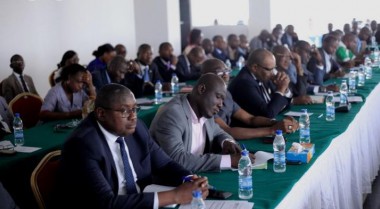
A Role for Youth in Promoting Peaceful, Just and Inclusive Societies
New York, 19 July – ‘The Role of Young People in Promoting Peaceful, Just and Inclusive Societies', a side event co-organised by the Civil Society Platform for Peacebuilding and Statebuilding (CSPPS), UNDP, UNPBSO, Cordaid, Search for Common Ground (SFCG) and the United Network of Young Peacebuilders (UNOY), on behalf of the Inter-Agency Working Group on Youth and Peacebuilding, in conjunction with the High Level Political Forum on Sustainable Development (HLPF 2017), discussed young people's role in promoting peaceful, just and inclusive societies, by showcasing promising examples, innovations and by expressing and discussing challenges for meaningful participation by young people in peacebuilding.
The UNSCR2250 recognizes that young people play an important and positive role in the maintenance and promotion of international peace and security. However, this is still a challenge in some contexts...
The event, moderated by Peter van Sluijs, Senior Strategist and CSPPS Coordinator at Cordaid, focused on three case countries namely Afghanistan, represented by Ms. Sofia Ramyar, Executive Director, Afghans for Progressive Thinking; Libya, represented by Marouane Bakit, Makers of Hope and Nigeria, represented by Theophilus Ekpon, Executive Director of the Centre for Sustainable Development and Education in Africa & CSPPS Focal Point in Nigeria.
The UNSCR2250 recognizes that young people play an important and positive role in the maintenance and promotion of international peace and security. However, this is still a challenge in some contexts according to reports of some of the youth-led organizations contacted in context of the UNOY Peacebuilders and Search for Common Ground Mapping Sector report. Among other challenges, youth-led organizations reported political manipulation, lack of participation, high levels of gender inequality and the issue of safety preventing youth organizations from sustained and meaningful engagement.
The international community needs to support youth-friendly environments considering country-specific needs, echoed Marouane. He further explained that young people are perceived as the problem in his context but leaders can support them and perceive them as positive actors of change – youth can be part of the problem but are also key actors when designing solutions. Prevention and early warning can help leaders to overcome hostility, a strong comment by Theophilus showcasing some of the initial findings of the CSPPS-supported research on the Role of Young People in Preventing Violent Extremism in The Lake Chad Basin – a research that fits into the Global Progress Study on Youth, Peace and Security. Theophilus was seconded by Marouane, who called on international interventions to be holistic when supporting youth to prevent and counter violent extremism. Sofia shared an example from Afghanistan where Afghans for Progressive Thinking is teaching students how to embrace diversity to promote a spirit of peace.
The UNOY/SFCG mapping report recommends space to be enlarged for youth participation and recognition of youth-led organisations on equal footing to support meaningful participation and involvement of youth in peacebuilding. Theophilus shared a success story emanating from youth inclusion in Nigeria where youth advocacy efforts resulted in Nigeria government exploring potentials for implementation of the New Deal for Engagement in Fragile States.
Concluding the event, Peter alluded that there are still challenges for civil society to be part of what is supposed to be the transformative multi-stakeholder partnership approach in the operationalization of SDGs. Though membership driven, it should allow civil society – including youth organizations to be brought to the table, to be given the opportunity to partner and participate. This is a concern that civil society is trying to address at various levels. Peter continued that Goal 16, and all included in it, is an accelerator for success of the whole 2030 Agenda. He further suggested that there should be a review on what countries are doing to implement Goal 16 on an annual basis – as done with Goal 17. Peter urged for the need to progress on SDG16 both at national and international levels. If we are not doing that, we are missing the chance of making the 2030Agenda as success.
Watch side-event video recording here

